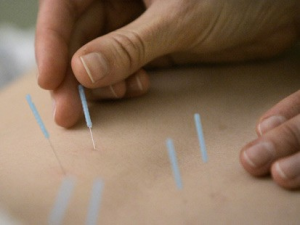
BMC Complementary and Alternative Medicine supports the publication of high-quality research into acupuncture.
Last week was Acupuncture Awareness Week, an initiative supported by the British Acupuncture Council which aimed to better inform the public about this complementary therapy.
Acupuncture is an ancient system of treatment, and is one of the most widely accepted forms of alternative medicine operating today. A quick search using the ‘find a qualified acupuncturist’ tool on the British Acupuncture Website shows that there are at least 20 registered acupuncturists operating within easy walking distance of the BioMed Central offices in central London.
How does acupuncture fit into the theories and practice of modern medicine? According to the theory of traditional Chinese medicine, there is an energy called ‘qi’ which flows through all of our bodies, and diseases are caused by a disregulation of this energy flow. In acupuncture, the insertion of needles at specific points called ‘meridians’ acts to correct the energy flow, and thereby heal the patient. However, there is no modern correlate in scientific knowledge to  the concept of ‘qi’, and the mechanisms by which acupuncture works are still strongly debated in the field. Perhaps more importantly, evidence on the effectiveness of acupuncture is still limited.
the concept of ‘qi’, and the mechanisms by which acupuncture works are still strongly debated in the field. Perhaps more importantly, evidence on the effectiveness of acupuncture is still limited.
Compounding the problem, there are also several problems which afflict research into acupuncture. Firstly there is the issue of publication bias, which can lead to the publication of a disproportionate number of positive results, while negative findings are never brought to light. A recent Commentary piece published in our sister journal BMC Psychology (also reported in The Guardian) highlighted how much this bias can negatively impact a scientific discipline. This issue is a common theme in striving towards high-quality research in complementary and alternative medicine, which we have previously also raised on our blog.
Additional problems in acupuncture research can be attributed to the difficulty in providing a placebo control group when performing clinical trials. To be adequately blinded, patients need to be unaware that they are receiving true acupuncture or sham acupuncture. How to do this in acupuncture research, when it is usually quite clear whether a needle is inserted into the body or not, is a tricky proposition.
To illustrate the problem, one possible control group option involves inserting needles into points away from ‘meridians’. However, this is founded on the belief that acupuncture is effective only when performed on meridians, which is yet to be proved. In this case, if there are no differences between the active and control groups, who is to say whether it is because both treatments are effective, or because they are both ineffective?
BMC Complementary and Alternative Medicine would be very interested to hear any thoughts, and to receive submissions, suggesting possible ways around this problem.
Finally, numerous systematic reviews have shown that there is a problem with the quality of studies performed in acupuncture research. This is an issue which greatly concerns BMC Complementary and Alternative Medicine, and one which we are determined to actively address. We closely assess the quality of all trials submitted to the journal, and will not send to external peer review any studies which we consider to be of low methodological quality.
In a field that can be as controversial as complementary and alternative medicine research, it is doubly important that we ensure adherence to the correct standards of rigorous scientific methodology and accurate reporting.
2 Comments